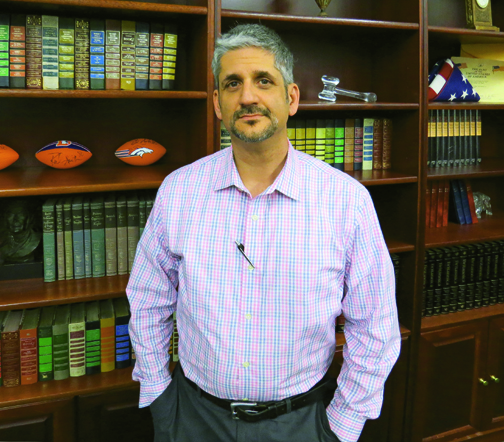
by Mark Smiley | Jan 30, 2017 | General Featured
 by Mark Smiley
by Mark Smiley
Step 13 has hired only its third Executive Director in 30 years, Paul Scudo. Scudo who had served as Director of Programs the last two years was hired after the search committee narrowed down the field of candidates to 12. He officially began his role in October 2016, but he was serving on an interim basis since last June. Peter Droege who was the Executive Director left the organization in May 2016.
For more than 30 years Step 13 has helped men overcome addiction and become contributing members of society through a “tough love” residential program that requires sobriety, work, and accountability. There is a zero-tolerance policy for drinking or drug use, and work is required from day one in the program.
The organization was founded by Bob Coté and his legacy lives on at the organization. Scudo not only acknowledges this, he embraces it. “We are privileged that for years Bob broke his back and did whatever it took to keep the doors open, help men out, and get the name Step 13 out in the community, and generate a donor base,” said Scudo.
Scudo was born in Philadelphia, and lived there until he was 16 when his parents moved to Charlotte, N.C. After graduating high school, he went to Michigan State University and got a degree in Hospitality Business. It is here where he met his two best friends who eventually saved his life and put him on the path to recovery. He moved to Denver and worked for the Hyatt Hotels Corporation and then the Hilton Worldwide Holding as Regional Director of Sales and Marketing.
It is in this position where Scudo made a comfortable living. He had an attractive home in Park Hill, with a loving wife, and for those who knew him, a pretty good life. But, Scudo kept a dark secret. He had become addicted to cocaine and alcohol and his addiction took a turn for the worse starting in 1998.
Five years later, in 2003, he was arrested for possession of narcotics and put into drug court. Even with the possibility of having a felony on record and going to jail, Scudo could not stop using drugs.
He continued to test positive on court ordered probation tests. The court would put him in jail for two days once a month for four years. Because Scudo showed up in a business suit and made seemingly valid excuses, they would continue to give him opportunities.
Finally, those opportunities would run out as his excuses were no longer accepted. In 2007, the court finally revoked deferred judgment, charged Scudo with a felony, and sent him to jail for six months. His 18-month probation that stretched to four years now converted into jail time.
After losing his job and serving his sentence, his first phone call after being released from jail was to his drug dealer. With no job and no income, but with a large amount of money in savings, a 401K, an IRA, Scudo became a hermit in his Park Hill home. He burned through $200,000 in 18 months, stopped paying the mortgage and all other bills, aside from the phone bill, so he could contact his dealer.
After the mortgage company and police officers came to his door and warned him to pay his mortgage or be evicted in 30 days, Scudo turned to doing more drugs.
After 30 days had expired, police officers came into his home and told him he had 10 minutes to gather what he could.
“I never, in my mind, believed I was going to lose everything,” said Scudo. Every other possession he had accumulated in his 40 years on the planet was thrown in a dumpster.
All of a sudden, Scudo was homeless. Over the next two years, he would hide in alleys and wooded areas. He would only go to populated areas to steal food from a grocery store or to get change to get a bottle of alcohol so that he could drink and numb the pain.
After being on the streets for two years, Scudo describes what was a spiritual intervention. He was in an alley and his two best friends from his days at Michigan State University came down the alley and said, “We finally found you, are you ready for help?” Scudo looked up at them and said yes but he couldn’t afford it. They told him they had it taken care of.
They put him into a drug addiction treatment center called CeDAR. CeDAR is integrated into the University of Colorado Hospital and is an expensive treatment facility. Scudo remained at CeDAR for three months.
He then moved to the Oxford House, a sober living home. He remained at the Ox-
Continued on page 15
Continued from page 5
ford House for a year and found it difficult to find work. A friend from his alcohol recovery fellowship group who owned a handyman business hired him to be his assistant. He worked for him for a year and started to volunteer at CeDAR.
His volunteer work would eventually lead to a full-time position as Recovery Care Manager at CeDAR after more education. He worked at CeDAR for three years and during this time was asked by the Anschutz Foundation (who funds both CeDAR and Step 13) to speak to the men of Step 13. Scudo volunteered for six months at Step 13 until one day Droege and then Board Chair Wendy Bergen pulled Scudo aside to ask if he would be willing to build a recovery program.
After volunteering to launch this program, it became clear it was going to take more of a full-time effort. Scudo was then hired in 2014 to be the Director of Programs for Step 13. “There was something in my heart telling me to do this,” Scudo said.
“I have a picture of Bob [whom he never had the chance to meet] on the wall in my office and I look at it every day to remind me I am lucky that he did all the really hard groundwork to get this organization where it is, and staying true to three key principles: sobriety, work, and accountability,” said Scudo. “While there’s been some change, the core philosophies remain the same. We are going to remain true to Bob’s original principles and we still believe accountability, self-sufficiency, partnered with work and individual recovery is how an individual restores their dignity and self-worth. We are going to help as many men as we can.”
Matthew Saks, chair of the board of Step 13 commented, “Paul Scudo is the ideal leader to take Step 13 into the future. He brings to this work so many important qualities: a deep sense of personal integrity, an understanding of nonprofit organizations and, most importantly, a profound passion for helping men in their struggle with addiction. In his work as program director, he has already transformed our recovery program into a national model for success. Having him in place as Executive Director ensures our organization’s sustainability and impact for many years to come.”
Scudo now lives with his new wife of four years, Cynthia, who has eight grown children and 20 grandchildren. Scudo, now 50 years of age, is appreciative for all of the gifts in his life. “I’ve changed the way I live my life,” said Scudo. “[It’s] about being of service and caring for other human beings. [It’s] how I interact with the average person I come in contact with.”
Scudo has a vision of where to take Step 13. He wants to open sober living homes and give men that are living at Step 13 that next step. He would also like to open up more Step 13 facilities across the state to help men in need.
“I’m humbled and I’m grateful for the opportunity to lead Step 13 into the future and in doing such, I’m going to stay true to Bob’s principles.”
Scudo is active in an alcohol recovery fellowship as a world delegate. He also enjoys camping, hiking, golfing, reading, bike riding, and movies. For more information on Step 13, visit www.step13.org.

by Mark Smiley | Dec 22, 2016 | General Featured
$500,000 In Renovations But The Name, Sign, Bar And Booths Stay

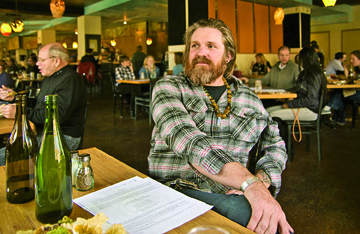 Home to an eatery since 1946, the corner of Exposition and University first opened as the Bel-Air and switched names to the Campus Lounge in 1949. Former Denver University and NHL hockey player Jim Wiste bought the business and real estate in 1976. The restaurant is expected to reopen as early as this month under new ownership.
Home to an eatery since 1946, the corner of Exposition and University first opened as the Bel-Air and switched names to the Campus Lounge in 1949. Former Denver University and NHL hockey player Jim Wiste bought the business and real estate in 1976. The restaurant is expected to reopen as early as this month under new ownership.
The sale of the Bonnie Brae landmark restaurant was announced to much fanfare with the last day of operation under the old ownership on September 25, but everything since that event has been shrouded in mystery, including who actually bought the business.
It was initially announced that a partnership led by St. Charles Town Company headed up by its president Charlie Woolley had acquired the Campus Lounge property along with fiction writer and vegan restaurateur Dan Landes. But a check of the real estate records by the Colorado Real Estate Journal showed that the property was, in fact, acquired by Exposition Avenue Properties LLC for $1.9 million with that entity headed by Wayne E. Barrett. Barrett is a vice president of ProLogic now headquartered in San Francisco but based in Denver until 2011.
“Wayne is an industrial real estate rock star,” Woolley told the Real Estate Journal. Barrett had hoped to remain anonymous in the Campus Lounge deal, Woolley explained. Furthermore, we’re told that Barrett is Woolley’s partner in another iconic restaurant, Wazee Lounge & Supper Club. Woolley bought the Wazee in 1997 but previously hadn’t disclosed Barrett was his partner. Since 1974 the Wazee Supper Club has been a landmark restaurant in Denver’s historic Lower Downtown district. Located at the intersection of 15th and Wazee Streets, it was founded by Angelo and Jim Karagas of My Brothers Bar fame.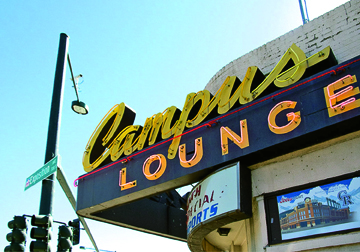
In the case of Bonnie Brae’s Campus Lounge, Barrett had already put the deal together when he called Woolley to participate in it. “He really likes these cool, iconic places,” Woolley told the Colorado Real Estate Journal of Barrett. “He has a real passion for them.”
But they needed someone to actually run the restaurant. Woolley was then introduced to Landes by Todd Colletti, owner of the Buckhorn Exchange. The storied steakhouse — Denver’s oldest restaurant — is where mounted game gaze on dishes of yak, ostrich, elk and Rocky Mountain oysters.
The More Things Change — The More They Remain the Same
Opening under the same name — possibly as early as this month — the Campus Lounge is keeping the horseshoe bar, the booths plus the Campus Lounge sign. To continue the legacy of the Bonnie Brae eatery, the new owner is spending approximately $500,000 on renovation.
Woolley says the eatery will pay homage to the car efree ambiance Jim Wiste created for the generation of families, patrons, and friends who frequented his beloved lounge.
efree ambiance Jim Wiste created for the generation of families, patrons, and friends who frequented his beloved lounge.
Landes’ vegan restaurant City O’ City is doing well in Capitol Hill, and Landes reportedly wasn’t looking for another restaurant but the Campus Lounge seemed too good to overlook. “It’s got all of the elements — the right neighborhood and a big kitchen — to get a return on investment,” he believes.
Meet Campus Suspect
Landes’ reputation as a Denver touchstone began as a restaurateur when he founded WaterCourse Foods in 1998 and City, O’ City in 2006. His other lifelong passion is for literature that is always brewing just beneath the surface. In 2012 he released his debut novel, Joonie and the Great Harbinger Stampede, a creation myth about the birth of consciousness, told through the lives of prairie animals. He sta rted his own publishing company, Suspect Press, in 2013 along with Brian Polk and Ken Arkind, and has published several of his own works since then.
rted his own publishing company, Suspect Press, in 2013 along with Brian Polk and Ken Arkind, and has published several of his own works since then.
The old Campus Lounge was famous for its burritos, burgers and beer. What the new menu will be is not yet revealed, but you can expect a full review of the revived restaurant in the next issue of the Glendale Cherry Creek Chronicle.

by Mark Smiley | Nov 21, 2016 | General Featured
by Ruthy Wexler
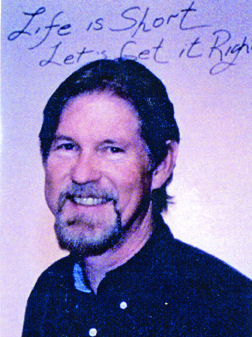 The John Hand Theater in Lowry is a singular Cherry Creek Valley experience. Welcomed into a tiny lobby, you feel . . . instantly at home. Sipping a glass of wine in your seat, you feel . . . curiously content. Watching talented actors give their all, you are stimulated, moved and somehow, included. When you leave, you feel . . . the opposite of alone.
The John Hand Theater in Lowry is a singular Cherry Creek Valley experience. Welcomed into a tiny lobby, you feel . . . instantly at home. Sipping a glass of wine in your seat, you feel . . . curiously content. Watching talented actors give their all, you are stimulated, moved and somehow, included. When you leave, you feel . . . the opposite of alone.
It’s exactly what John Hand had in mind.
Who is John Hand?
A charismatic guy with a million ideas, John left his revitalizing mark all over Denver. He ran an antique shop, owned a deli, bought and sold real estate, founded Colorado Free University . . . and that’s the short list. When the Lowry Air Force Base began its redevelopment in 1999, John, then 52, bought the base’s firehouse as a satellite building for CFU — but soon, he had another idea.
Love Of Theater
John loved the theater. He’d acted in plays, even written a musical, was especially drawn to how dramatic collaboration brought everyone more alive. The firehouse would be a community theater.
He hired an architect, drove to California to pick up a batch of old theater seats and soon, fellow enthusiasts joined him to sing and read plays. A core group emerged, an amateur acting troupe. John’s younger sister Helen, busy with her own career as a psychologist, came to watch productions. Of all his ventures, Helen saw, the theater was John’s center.
“I felt happy that John was living his dream,” she recalls. “And a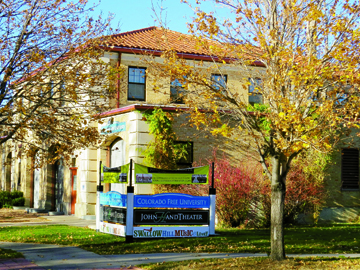 lways, amazed that he could do so much.”
lways, amazed that he could do so much.”
By 2004, light and sound equipment still in a cubbyhole, John was excitedly planning his first big play. The Ride Down Mt. Morgan, an early work by Arthur Miller, concerns a bigamist who must explain his life choices when both wives arrive at his hospital bed.
“In some ways,” Helen muses, “that play was reflective of John’s life. So many balls in the air…”
The balls all came crashing down on March 28, 2004, when a total stranger — a 19-year-old girl with an angel face and demon hallucinations — entered his home and stabbed John Hand to death.
Brother’s Dream Brought To Life
Helen could not accept such a meaning less end to her brother’s life. She wanted to honor him — but how? John had always been the one with ideas. “He was so articulate, so vibrant. I was a little more . . . retiring. I was dazzled by him. But he was a good big brother.” Helen laughs, remembering the time John taught her to fight back against a neighborhood bully. “Once we got outside, I sat on the ground and wouldn’t go any further. I let him down.”
less end to her brother’s life. She wanted to honor him — but how? John had always been the one with ideas. “He was so articulate, so vibrant. I was a little more . . . retiring. I was dazzled by him. But he was a good big brother.” Helen laughs, remembering the time John taught her to fight back against a neighborhood bully. “Once we got outside, I sat on the ground and wouldn’t go any further. I let him down.”
She would not let him down now. Helen went outside her comfort zone to ask for contributions so John’s big play could be produced. “People loved him, they were inspired by him, and so they gave.” Six months after John’s death, Firehouse Theater Company presented The Ride Down Mt. Morgan with professional sound and lighting.
She’d held up her brother’s dream. Now Helen couldn’t bear to see it die. She cut back her private psychology practice to take over the reins of Colorado Free University and the theater as well.
“At first it was spotty,” she recalls. “We would lose people, lose energy. I had to rely on others to mount productions.” But soon, Helen discovered that she liked reading scripts, enjoyed the actors. She began to take a more active role. “I’d entered a field where I had no experience or expertise and I found . . . tremendous satisfaction. And joy.”
Second Theater Company
To keep the theater afloat, Helen rented it out to local groups. In 2007, Spotlight Theater Company came on board as a regular renter. The two groups sparked each other. Since Firehouse was producing only four plays a year, they arrived at the arrangement we see today: Spotlight and Firehouse present alternate productions at the John Hand Theater.
“The way the shows dovetail from company to company is seamless,” sa ys Bernie Cardell, artistic director of Spotlight. “It’s a splendidly diverse program. Spotlight is more comfort food, makes you laugh, goes down easy. Firehouse explores the human heart.”
ys Bernie Cardell, artistic director of Spotlight. “It’s a splendidly diverse program. Spotlight is more comfort food, makes you laugh, goes down easy. Firehouse explores the human heart.”
Pat Salas, a season subscriber to both companies, says, “When I take people to the John Hand, they’re like, ‘Who? Where are we going?’ But then when we see the play, they always want to go back.”
What makes the productions so special? For starters, the theater. At 89 seats, it’s an intimate — and well designed — setting. “It has enough height and depth that you don’t feel crowded as an actor,” says Emma Messenger. “The acoustics are exceptionally good, fantastic for subtle acting. But the best part about the John Hand is the supportive people who work there. You always feel so cared for — and that nurturing feeling translates to better performances.”
“Why is the acting so good?” muses Bernie Cardell. “You just do better work when you’re feeling part of a family, right?”
This family is purposely inclusive. In the casts of both companies’ shows, there’s often a wide range of experience — another of John’s legacies. “My brother wanted to stage good productions, but he also wanted to provide a place for people to develop their skills,” explains Helen. “So we give opportunities.”
Not just beginners, but veterans benefit. Lauded actor Andrew Uhlenhopp recalls his role as King Henry IV in The Lion in Winter as “a challenge, that I faced with Helen’s great support. She involves herself in the theater in such a way that one feels inspired to grow.”
Helen Rocks
Guiding board meetings, raising funds, attending rehearsals — Helen is now the one with lots of balls in the air. “I’ve even seen her up on the roof checking for leaks,” says actor and set-designer Jeff Jesmer. “Helen rocks!”
“In the process of keeping John’s dream alive,” Helen says simply, “I was transformed.”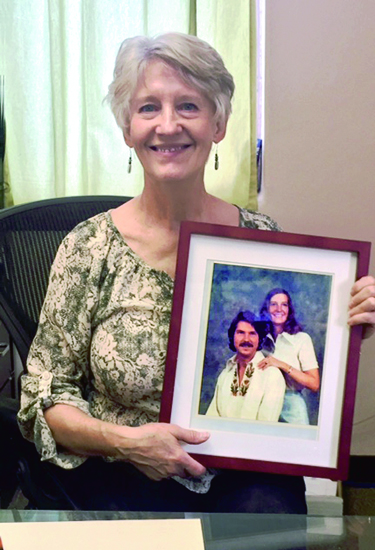
So was this tiny spot in Denver.
John’s murder ripped a hole in Helen’s family. What she ended up doing was creating a new family, whose heart is a powerful combination of John’s inventive boldness and her own loving kindness.
On a recent evening, the house was full, the lights had dimmed, when a young couple entered the theater, obviously on a special date — and dismayed at the lack of two seats together. Immediately, three individuals stood, conferred, rearranged — then pointed the couple to a now empty pair. After a burst of affectionate laughter, everyone settled in to watch the show.
Upcoming Season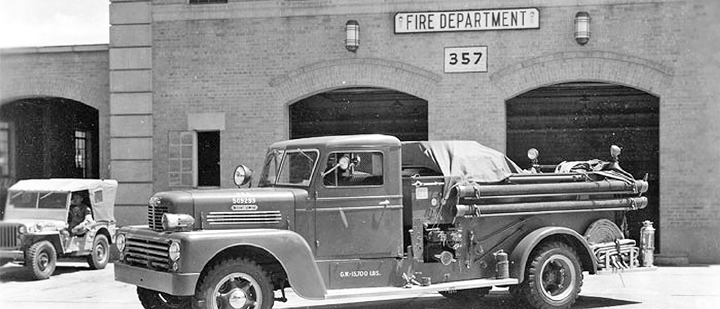
Theatergoers who want to enjoy the intimacy of the John Hand Theater can look forward to a rich menu in 2017. Helen is particularly proud of Firehouse’s January show: Becky’s New Car, by Stephen Dietz. “The playwright is local, the play is sharp, funny, yet touching and thought-provoking . . . exactly the sort of production John loved.”
In the spring, another sharp comedy, Crimes of the Heart will premiere. And in the summer, Helen is pleased to present an original work by Firehouse board member Debbie Montgomery, Rock of Aging, a parody of ’60s and ’70s bands, with familiar songs hilariously rewritten to address the humiliations of old age.
Alternating with the above is Spotlight’s run of funn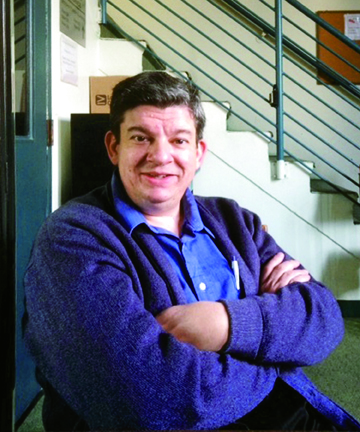 y, scary and heart warming. In February and March, Sabrina Fair (remember the movie with Audrey Hepburn?); in May, Scotland Yard by Jeffrey Hatcher; and that well-known gem On Golden Pond completes the season.
y, scary and heart warming. In February and March, Sabrina Fair (remember the movie with Audrey Hepburn?); in May, Scotland Yard by Jeffrey Hatcher; and that well-known gem On Golden Pond completes the season.
Looking to future seasons, Bernie Cardell sees Spotlight still offering its comfort fare of classics, mysteries, comedies and farces, but spiced with some more challenging works. Firehouse Theater Company will keep exploring the vagaries of human relationships, leaving audiences thinking and talking as they leave the theater. And they both intend to stay at the John Hand.
Visit www.johnhandtheater.com to find links to both company’s shows.
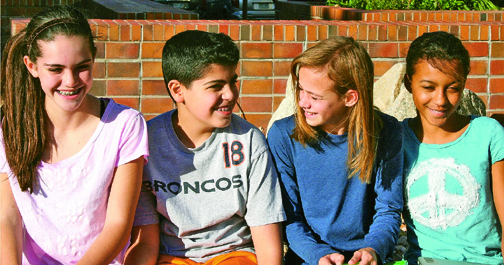
by Mark Smiley | Oct 21, 2016 | General Featured
Four Area Kids Turn Their Passion For Helping Into A Booming Non-profit Aiding Their Needy Peers
by Glen Richardson
 Whiz, bang! Meet the Valley’s secret weapons: Cailey Karshmer, Abby Foster, Chloe Howard, and Lior Yaron. Bursting with energy, these four young people are a pushover when it comes to helping sick, disabled, homeless and underprivileged kids by raising awareness, volunteering and supporting their needs.
Whiz, bang! Meet the Valley’s secret weapons: Cailey Karshmer, Abby Foster, Chloe Howard, and Lior Yaron. Bursting with energy, these four young people are a pushover when it comes to helping sick, disabled, homeless and underprivileged kids by raising awareness, volunteering and supporting their needs.
This foursome of super-knowledgeable youngsters that possibly live on your block is behind Colorado Kids for Kids, a kid-run not for profit 501 (c)(3) organization. At a time when most kids their age are focused on music, sports or just themselves, these kids are working wonders in neighborhoods across the Valley by giving back to the community and helping kids who are less fortunate.
Encouraging us all to give back to the community, they organize school supply drives, collect clothing (winter coats, boots, gloves, hats), host holiday parties for homeless children and read to kids at under-funded schools. Moreover, they encourage other Valley kids to volunteer. They urge other children to help them collect books and toys to donate and also donate wrapping paper for the organization’s holiday drive. Furthermore they encourage youngsters of all ages to “Volunteer with us or help host or coordinate one of our events.”
Game Changer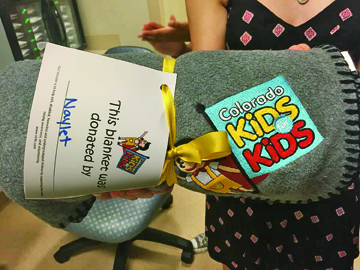
Cailey Karshmer, now a Cherry Creek High student, is the founder of Colorado Kids for Kids or CK4K. At age six she donated her birthday presents to children at a homeless shelter where a friend of her aunt’s worked. “It made a huge impact on me and I decided to donate my presents every year,” she recalls. When she turned 10 she no longer had birthday parties but wanted to continue to donate money instead of gifts from her family on her birthdays. After learning about non-profits she asked her parents if she could set up a non-profit to benefit children in need and CK4K was born.
To get started she needed a board of directors and her best friend Abby Foster, currently a George Washington High School student, volunteered to be the secretary. Chloe Howard, now at Kent Denver, was volunteering at a local soup kitchen and at her church when she came on board as vice president. “I joined Colorado Kids 4 Kids because I love to help people in the community,” she explains. Presently a Cherry Creek High School student, Lior Yaron was 11 when the organization started and he signed on as treasurer. “I was treasurer of my school at the time and I am very proud to be a member of Colorado Kids 4 Kids,” he adds. Speaking for the Board, Abby Foster says, “We want to make a difference in kids’ lives. This organization has encouraged us to give back to the community and as we continue to grow we would like other children to follow in our footsteps.”
The organization began their school supply drive five years ago when Cailey was walking out of school on the last day and saw that many of the kids had thrown away their school supplies, a lot in prime condition. The next year, Cailey and the board decided that they were going to collect gently used school supplies and donate them to an under-funded school. The first year, supplies were donated to DCIS at Fairmont, and the school supplies could be carried in the back of two SUVs. The next year they collected so many supplies that they had to rent a U-Haul to deliver them to Boston K-8.
School Supply Store
This past year, CK4K collected a copious amount of supplies plus receiving a very generous grant to purchase more supplies. Due to the amount of school supplies, and the desire to reach more kids across the metro area, the board decided to open a school supply store where kids who could not afford school supplies could shop for free. “The store’s concept is loosely based on a local food pantry,” explains Abby Foster. Children were able to choose supplies rather than be handed pre-selected materials. In addition, each child received a High Sierra backpack.”
Overall, more than 350 kids and 50 schools w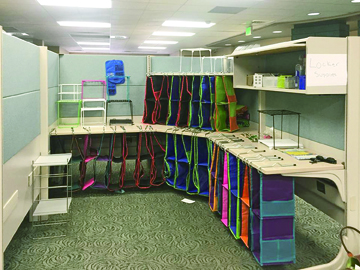 ere impacted by the board’s endeavors. The store — located at 6875 E. Evans Ave. just off Monaco Parkway — was open for three days during August. To keep kids supplied with school needs the store will be open one Sunday a month beginning in February.
ere impacted by the board’s endeavors. The store — located at 6875 E. Evans Ave. just off Monaco Parkway — was open for three days during August. To keep kids supplied with school needs the store will be open one Sunday a month beginning in February.
The organization is also sponsoring a “Get One, Give One” blanket campaign. They are high-quality fleece blankets embroidered with their CK4K logo. For every blanket sold another blanket is donated to a child in need. In August, they were able to donate over 80 blankets to Rocky Mountain Hospital for Children. Kids and families can participate by purchasing a blanket ($20) or by helping them sell blankets. Groups and organizations can also use them as a fundraiser.
Public, Business Backing
Karshmer also credits the staff and her classmates at Graland — where she graduated with honors — for their encouragement and support when she started CK4K. At Graland she participated in the Gates Invention Program with her friend Lily Fox. Lily’s mom was in a wheelchair and had difficulties navigating cobblestones. The two girls created an all terrain attachment designed to roll over uneven and bumpy terrain without getting stuck. The two won second place in the competition and were given a “patent nod.” They were paired with a lawyer who helped them through the patent process, paid for by the Gates Foundation. Last year, Cailey and Lily received U.S. patent D749018 S1 from the U.S. Patent Office.
Community support for the kids’ non-profit has vastly exceeded all expectations. For example, Arapahoe County Government, Public Works and Development staff recently held a school-supply drive for Colorado Kids for Kids. Businesses are also kicking in their support. Foster, Graham, Milstein & Calisher, LLP, Anabliss, Mile-High Embroidery, Periodontal Associates, Mile High United Way and Rapid Networks have generously donated their services and/or money to support CK4K. “I am shocked by how many neighbors, businesses and friends are contributing,” says board treasurer Yaron.
Cailey Karshmer started Colorado Kids for Kids because she wanted to volunteer in her community but was limited by her age. “Our organization provides kids, no matter what age, with the opportunity to help,” she notes. “Have you ever wanted to volunteer somewhere but you were too young?” she asks other kids. “Well you can come volunteer with Colorado Kids for Kids! We would love to have you come and help us. Help us by planning an event, raising awareness or volunteering,” she urges other youngsters.
kids, no matter what age, with the opportunity to help,” she notes. “Have you ever wanted to volunteer somewhere but you were too young?” she asks other kids. “Well you can come volunteer with Colorado Kids for Kids! We would love to have you come and help us. Help us by planning an event, raising awareness or volunteering,” she urges other youngsters.
“Colorado Kids for Kids wants to make communities in the Valley a better place and we could use your help.” Information: 720-215-3225.
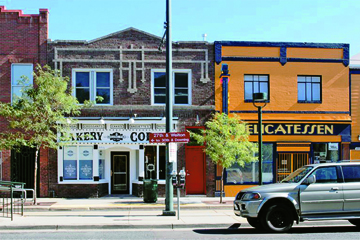
by Mark Smiley | Oct 3, 2016 | General Featured
November 8 Vote Pits The Politically Connected Against Local Property Owners
by Megan Carthel
Five Points has been a neighborhood plagued with improvement promises and nothing to show for them. In 1994, the D Line was built through the middle of Welton Street by RTD, bringing less than satisfactory results.
A cultural center for decades where Jazz and Black culture used to thrive along Welton Street, there now stand empty buildings, ghosts of once was. Now, the city and residents are hoping to revive the once robust area — the question is whether a business improvement district (BID) or the free market should kick-start this inevitable change.
On May 31, 2016, the Denver City Council approved the formation of the Five Points BID, but come November 8, 2016, the commercial property owners will have the final say with a vote.
Currently the Five Points neighborhood has the Five Points Business District (FPBD) that has focused on business development and cultural promotion and preservation. Tracy Winchester, Executive Director of the FPBD, has helped to aid the start of a BID along the Welton Street corridor. The BID will supplement City services like security, maintenance and beautification for the 10 blocks of Welton Street from 20th to 30th streets.
“I think it’s important that we have a business improvement district in the Five Points area along the Welton street corridor, which has always been a historically commercial corridor,” Winchester said. “And I think it’s important that we mobilize ourselves as businesses that do have a vested interest in seeing the survivability of this corridor and not only for the businesses that are here, but also for the residents that are here.”
Myron Melnick, a commercial property owner in the district since 1996, opposes the BID. He even wrote a piece in Brother Jeff, a local media outlet. Days after his piece was published, his building was tagged with spray paint.
“I think these people [who are for the BID] are reacting to what’s best for them,” Melnick said. “I’m neutral as far as that goes. What’s best for the neighborhood is what’s best for me, but I don’t want to see McDonald’s there, I don’t want to see Kentucky Fried Chicken there.”
When asked about the tagging, Councilman Albus Brooks said the following:
“I can’t think of a better way to support this effort,” Brooks said. “There’s no security there today. This allows security to be in place. This allows security to see something going on and securing the area and calling the police. That’s a problem with Welton; there’s just not enough eyes right now in all of these locations.”
The Five Points BID will focus on maintenance, security and beautifying the area.
“We’re pretty much following the path of other neighborhoods, business corridors that want to see improvement in their neighborhood as it relates to the business area,” Winchester said.
“I don’t want to pay more taxes, more property tax,” Melnick said. “What do I need the city or this organization to shovel my walk and pick up litter? I don’t need that.”
The BID has an estimated budget for 2017 of $161,988, with $156,996 coming from a 10 mill levy on commercial property owners. The other $4,992 comes from a Local Maintenance District currently in place that will be removed if the BID is approved. The FPBD will assist with administrative needs for two years and then will no longer be active. The BID board will then have to decide how those administrative needs will be met.
Dr. Renee Cousins King, Paul Books, John Pirkopf, Nathan Beal and Carl Bourgeois were appointed to the BID board. Together, the board makes up over 15 percent of the total acreage and over 16 percent of the total value of the Welton Street BID boundaries. In order for a BID to pass, 50 percent of both the acreage and assessment values must be in favor. In total, the BID received just over 56 percent of the acreage and 62 percent of the assessment value in favor.
Some commercial property owners see a different vision than what they feel the BID board sees. Blair Dunn, commercial property owner on Welton Street, feels with a BID in place, larger commercial chain businesses will come into the area, pushing out the smaller businesses, and with it, the historical cultural importance.
“I think losing that identity would be the worst thing in the world,” Dunn said. “It kind of identifies the area, and what I hear from the BID is zilch as far as keeping that, keeping Black businesses, keeping kitchy stuff. It’s almost like the message is that ship has sailed and we’re going for intense hipster growth.”
Dunn also owns property on Colfax, where there is a BID in place. Before the BID was instated on Colfax, he paid $1,500 in taxes, now he is paying over $4,000. Dunn and Melnick both said they would prefer an organic growth of the Five Points neighborhood. Chuck Sagere, a close by resident who visits the Welton Street corridor often, thinks a BID would help to revitalize the area and is worth the cost.
“I think it’s beneficial. It does need to be revitalized. I particularly would like to see the nostalgia of the era when this place was thriving and keeping things clean and neat only brings it back to life,” Sagere said. “Nostalgia costs. I think it’s a benefit of a hundred times the amount (commercial property owners) pay out.”
“Retail wants to locate in places that are free of crime,” Brooks said. “This BID will hire security; this BID will have clean streets. This BID will bond against itself to do a two-way street. So, it’s about changing the environment and infrastructure, and that’s where retail wants to go.”
There are multiple developments going into the Five Points neighborhood. Star Mesa Properties is currently conducting a $1 million renovation in hopes to house retail, office or restaurant space at 2801 Welton St. Pirkopf and his partner bought 2737 Welton St. where a barber shop and salon once stood. The 109-year-old single-story building will be replaced with a two-story structure.
On November 8, 2016, a TABOR election will be held for commercial property owners, either solidifying or rejecting the BID.
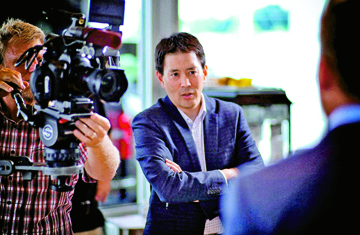
by Mark Smiley | Aug 29, 2016 | General Featured
News That Local Filmmakers Won Distribution Rights
Is Exciting, Particularly For Two Short Films Worldwide
by Glen Richardson
 Getting a distribution deal for a film is the aspiration for almost all filmmakers. But it can be tough — thousands of films are produced every year, and very few make it to the next level. It is even harder to get distribution for a short film. So it is a true achievement for Denver’s BS Filmworks to have landed a Shorts.TV distribution deal for not just one, but two of their short films. Furthermore both films were created through the 48 Hour Film Project — a worldwide competition where films are written, shot, and edited in a 48 hour time period.
Getting a distribution deal for a film is the aspiration for almost all filmmakers. But it can be tough — thousands of films are produced every year, and very few make it to the next level. It is even harder to get distribution for a short film. So it is a true achievement for Denver’s BS Filmworks to have landed a Shorts.TV distribution deal for not just one, but two of their short films. Furthermore both films were created through the 48 Hour Film Project — a worldwide competition where films are written, shot, and edited in a 48 hour time period.
Filmmakers Brock Sherman (the B in BS Filmworks), Scott Takeda and Lori Kay Allred (Takeda’s wife) of BS Filmworks recently signed an agreement with Shorts.TV to get worldwide television distribution for their short film “If Not Now” — a film about a family dealing with an aging parent and dementia. The film began airing on Shorts.TV this July. Shorts.TV is the global home to the world’s highest quality short films. Headquartered in London with its U.S. office in Los Angeles, Shorts.TV has produced the Oscar Nominated Short Film theatrical release since 2006 and distributes other exceptional short films to 54 countries through various platforms including cable, satellite and iTunes. In Colorado, viewers can see Shorts.TV on DirecTV, AT&T, and CenturyLink.
“We’re obviously ecstatic about this,” admits filmmaker Takeda. “We know it’s rare to get distribution for films, especially short films. And Shorts.TV only accepts the top short films produced worldwide, so we’re honored that they chose us.”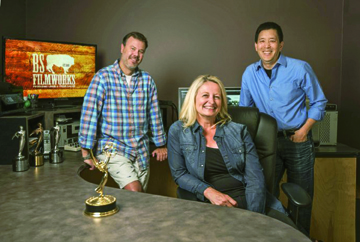
Coming To Colorado
“We really responded to ‘If Not Now,’” adds Efren Rodriguez of Shorts.TV. “It’s a beautiful, character-driven story that is very well done. We’re also excited that the director Lori Kay Allred is female. Hollywood needs diverse voices, and we like that she took a personal story and brought it to life on camera.”
“Our goal is to produce feature films in Colorado and bring TV/Film work back into the state,” says producer Sherman. “This film is a great example of the kind of filmmaking we do because it’s a story that’s personal to us and full of complex characters.”
in Colorado and bring TV/Film work back into the state,” says producer Sherman. “This film is a great example of the kind of filmmaking we do because it’s a story that’s personal to us and full of complex characters.”
Shorts.TV has also purchased U.S. and foreign distribution rights to another BS Filmworks short film called “The Decision.” This film was shot last summer in Croatia and is about a young woman choosing between the wishes of her family and her desire to choose her own path. Allred also directed this film.
Decision Coming
“The Decision” was entered into the 2015 local 48 Hour Film Project competition, but has gone through multiple re-shoots. “We wanted to do something different with ‘The Decision,’” explains director Allred. “We shot a version for the competition, and then decided we wanted to tell a longer story with more depth. So we rewrote the script and shot new scenes in both Croatia, and later in Denver.
“The Decision” will appear on Shorts.TV later this year. BS Filmworks is currently working on two features — a story about Colorado’s internment camps and the other is a family drama set during the holidays.
The BS Filmworks trio of Allred, Sherman and Takeda are all Emmy award-winning storytellers. Lori Allred is a national Emmy winning writer for her work on the “Food Network.” Brock Sherman is a multiple regional Emmy winner and has won the national New York Festivals WorldMedal for his graphics animations. And Scott Takeda works both behind and in front of the camera as a director and TV/ Film actor.
Takeda’s Role
The Chronicle first featured Scott Takeda for his acting (March 2013). As an actor, his film roles have included parts in Everything Must Go, Dallas Buyers Club and Gone Girl. He worked as a photojournalist/ producer for the CBS-owned TV station KCNC from 1992 until 1994. From 1995 to 1997, he was a producer and director for the sy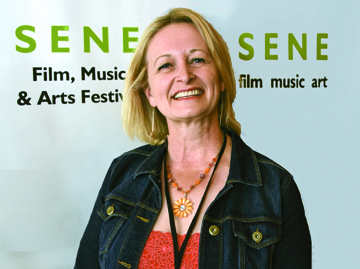 ndicated children’s show News-for-Kids. Takeda’s television acting debut came with a guest star role on Easy Money in 2009. He later played the character of Stella’s father, Mr. Yamada, in the 2011 Disney Channel TV movie Lemonade Mouth. In 2015, he guest starred on the television series American Crime, The Messengers, and Grimm among others.
ndicated children’s show News-for-Kids. Takeda’s television acting debut came with a guest star role on Easy Money in 2009. He later played the character of Stella’s father, Mr. Yamada, in the 2011 Disney Channel TV movie Lemonade Mouth. In 2015, he guest starred on the television series American Crime, The Messengers, and Grimm among others.
Takeda’s wife Lori is a producer with High Noon Productions and works on several high-profile HGTV shows, such as Diners, Dives and Drive-ins. The couple has lived in the Cory Merrill neighborhood for more than 23 years.
Takeda also runs Takeda Entertainment, a production company that produces corporate films and documentaries, including the Emmy-nominated 1996 documentary The Holocaust: Colorado Remembers, which he wrote, directed and produced. The fir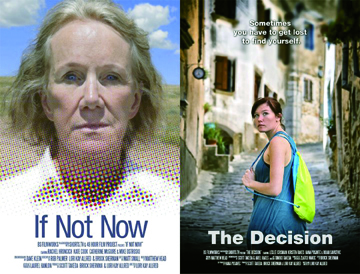 m’s list of corporate clients touches nearly every category of corporate America. There’s telecommunication firms like BellSouth and Echostar and financial giants such as GE Capital and Morgan Stanley on the list. The equally diverse list of local clients includes the Arvada Center, the University of Colorado and Western Dairy Association. Hallmark Entertainment and FOX have been among their programming clients.
m’s list of corporate clients touches nearly every category of corporate America. There’s telecommunication firms like BellSouth and Echostar and financial giants such as GE Capital and Morgan Stanley on the list. The equally diverse list of local clients includes the Arvada Center, the University of Colorado and Western Dairy Association. Hallmark Entertainment and FOX have been among their programming clients.
Corporate Clients
This August Takeda’s Entertainment crews hit the road for on-location shoots for Sub-Zero/Wolf/Asko — the high-end manufacturers of kitchen appliances. They were filming an installation program and showing how it is a key part of delivering a premium experience for their customers. “Two years ago, we produced a B-to-C film that showcased Sub-Zero’s industry-leading service program,” explains Takeda. “We focused our storytelling efforts around humanizing the service experiences. This time, we were showing how Sub-Zero’s installation program is building on those efforts and creating better customer service.”
The firm’s automotive projects have included work for Buick, Saab and General Motors (Detroit and Mexico). Earlier this year, Takeda’s creative team was busy putting the finishing touches on a corporate documentary film for Cadillac. The goal was to tell a story about a new sales program.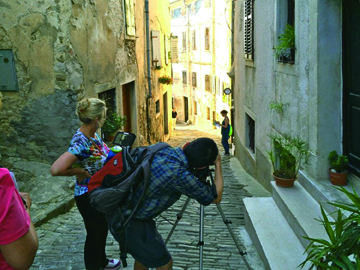
“We’re passionate about telling stories with emotional impact because it’s harder than ever to reach and affect an audience. Genuine people stories cut through the clutter,” he believes. “Whether we’re interpreting creative ideas and pairing them with global brands like Cadillac or directing a film, we know how to reveal powerful, honest moments. Every story. Every time,” Takeda concludes.

























